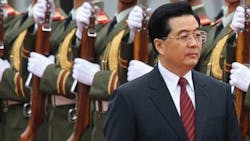Free-trade Zone in China Spurs Hope for Reform Revival
SHANGHAI -- A planned free-trade zone in Shanghai is raising hopes that China's new leaders will revive long-stalled economic reforms as they seek to make their mark.
China has become the world's second-largest economy and a driver of global growth thanks to a boom unleashed three decades ago when the Communist Party loosened state control of business and began to embrace the market. But deep reforms slowed over the past decade under the conservative President Hu Jintao, despite pleas from its trade partners, analysts said.
Some Chinese academics say the free-trade zone (FTZ) is on par with the special economic zones China set up in the 1980s and its commitment to join the World Trade Organization in 2001.
However, foreign businesses are waiting for details to see how far-reaching the changes -- initially limited to the FTZ -- might be.
"It's a real try to put some of the reforms into place," said Stefan Sack, vice president of the European Union Chamber of Commerce in China. "We have been lobbying for some of these reforms for a long time. However, this is not going to change the structure of the country."
The FTZ scheme comes as hope for political reform dims and Beijing targets foreign firms across a range of industries for alleged overcharging.
But a draft plan seen by AFP shows it goes beyond trade liberalization to include investment and financial services, and covers 19 distinct sectors.
Chinese Premier Li Keqiang, who took office in March, has seized on the FTZ and made himself its top political patron, seeking to claim it as one of the achievements of his young administration.
"We will explore new ways to open China to the outside world, and Shanghai's pilot free-trade zone is a case in point," Li wrote in the Financial Times this week.
Question of Timing
Although the idea for an FTZ was floated under previous premier Wen Jiabao, there was a belief it would be easier to accomplish after the once-in-a-decade power handover within the ruling party, officials say.
One reason was that with Shanghai's Communist Party chief Yu Zhengsheng due for promotion, officials were waiting for the city's new leaders to come in and oversee the project longer term.
Analysts said China could be using the zone as a stepping stone towards an investment treaty with the United States and even a relationship with the proposed Trans-Pacific Partnership (TPP) trading bloc. China was initially hostile to the U.S.-backed TPP but has reversed course, raising hopes among its trading partners for reform.
Li, speaking at the World Economic Forum's "Summer Davos" meeting, said Beijing had an "open and inclusive" attitude towards the TPP. But China is not part of the TPP negotiations and high demands for entry raise questions over whether it could ever join, even if it was allowed, analysts said.
Chinese academics say reforms successfully piloted in the FTZ -- due to be inaugurated this month -- can be applied in other cities or even nationwide.
Beijing has repeatedly vowed to make its yuan currency freely convertible, liberalize interest rates, simplify approval processes for businesses, and open up more to foreign investment, among other steps.
And Li indicated his desire to nurture change in his speech at the World Economic Forum, saying: "China's modernization will not be accomplished without reform, nor will it be achieved without opening up.
"Without structural transformation and upgrading, we will not be able to achieve sustained economic growth."
Letting registered companies freely trade the yuan currency is one of the reforms proposed for the zone.
But analysts say the nationwide process will be slow and gradual. "It's signaling the new government does want to do stuff, does want to experiment, does want to move towards the market -- those are all positive," said Stephen Green, head of research for Greater China at Standard Chartered Bank.
But he added: "For capital account convertibility, let's see how far they go with that. I would be very surprised if they allow full convertibility."
Companies would have to be registered in the FTZ and open special accounts to trade yuan, a Shanghai government official said. The government is seeking to identify foreign banks to set up entities in the zone.
Bankers say the industry regulator has approached Britain's HSBC and Standard Chartered Bank, as well as Hong Kong's Bank of East Asia -- all early arrivals in the Chinese market. HSBC said it was "interested in a presence."
A Shanghai official also said the government has approached online payment provider PayPal, part of Internet giant eBay, about cooperation as it seeks to make the FTZ a center for international e-commerce transactions.
-Bill Savadove, AFP
Copyright Agence France-Presse, 2013
About the Author
Agence France-Presse
Copyright Agence France-Presse, 2002-2025. AFP text, photos, graphics and logos shall not be reproduced, published, broadcast, rewritten for broadcast or publication or redistributed directly or indirectly in any medium. AFP shall not be held liable for any delays, inaccuracies, errors or omissions in any AFP content, or for any actions taken in consequence.
